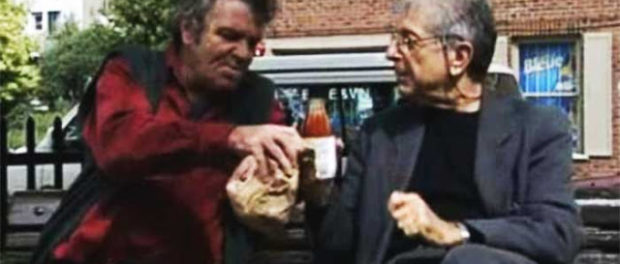MONTREAL THEN: Ode to a Street Persona
Who has not, in recent years, come across Montreal’s “Banana Bandit” somewhere on Crescent or Bishop on a balmy Saturday night? He first tried to “hold me up” when I was exiting Hurley’s Pub one summer evening. I did not know that this was a long-standing joke in downtown Montreal, and my first impulse, having grown up in the bad-ass rust belt town of Buffalo, N.Y., was to punch first and ask questions later. Luckily, I did not, though his joke quickly wore thin when he tried to hit me up for spare change.
Who among us has not looked away from poverty and desperation as we encounter the homeless sleeping in doorways in the winter cold, or begging in the Metro at the bottom of the escalator, so obvious they are impossible to ignore? Poverty is all around us, as are the lives of those living in despair, yet under the scum and crud, under the encrusted urine of stained, torn pants, is still a human being.
I will never forget Phil, the Beggar-Poet of Montreal, who would traverse the downtown and The Main flogging his verse to anyone who would listen. Phil was a former graduate of McGill University before things went bad. He was schizophrenic, a drunk, yet still someone’s father and brother. When he was lucid, he wrote original verse, often inspired by Tennyson. When he was not, when the schizophrenia took over, he drank and slept in alleys, one time having frozen off all of his toes on both feet so that he had to wear garbage bags tied over ill-fitting shoes; still, Phil kept on—persisting.
His brother, Pierre, made an amazing documentary of his life for the National Film Board of Canada called This Beggar’s Description. At the end of the documentary, there is a wonderful scene with Phil sitting in a park with Leonard Cohen discussing art and poetry. Leonard is drinking from a bottle of V8 and Phil is chugging beer from a brown paper bag. There is no divide — the two men both talk about their love of words, of women, of Montreal, of life… There was also a book about Phil — photos taken by his daughter chronicling encounters of shame, madness, and love on the streets of Montreal, a tapestry of Phil, the lost soul who is sometimes found again.
A few years ago, I went to a reading at the McGill Bookstore, one of Phil’s favorite haunts where he would appear at times to hawk his chapbooks of self-printed poems and sketches. Two poets were featured — one, a prominent Montreal writer, and the other, Phil. When it was his turn, Phil mounted the podium in all his scraggly glory, torn sweater, patched boots, scruffy, yet magically grinning. The poems were varied, some very good, others not so much, but through them I heard Phil’s voice, the complex contour of his tragic and colorful life.
I bought two copies — one for me, and one for my son, who is also a writer, because I felt he should have it. Ten bucks. Phil thanked me after signing the books. We looked at each other, and I was drawn into the depth of his eyes. After all, he had spilled out his life through his words, reading there to a small group of curious students and spectators. We shook hands and I felt the coarseness of his skin, saw the dirt under the nails, felt his warmth and the pulse of his flesh.
Phil then gathered his belongings, mostly wrapped in plastic shopping bags, a special one designated for the books of poems. He tucked a paper bag with a bottle into his faded jacket and left the bookstore, bent to it, as Kerouac once wrote.
It was sunny outside, an early spring day in Montreal. Phil shuffled off into the sunshine, east along Sherbrooke, along his own road, soon lost in the afternoon crowd.






